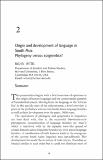| dc.contributor.author | Witzel, Michael E.J. | |
| dc.date.accessioned | 2012-04-12T18:38:31Z | |
| dc.date.issued | 2012-04-12 | |
| dc.identifier.citation | Witzel, Michael E. J. Origin and development of language in South Asia: Phylogeny versus epigenetics? Paper presented at Darwin and Evolution, mid-year meeting of the Indian Academy of Sciences, Hyderabad, India, July 3, 2009. | en_US |
| dc.identifier.uri | http://nrs.harvard.edu/urn-3:HUL.InstRepos:8554510 | |
| dc.description.abstract | This presentation begins with a brief overview of opinions on the origin of human language and the controversial question of Neanderthal speech. Moving from the language of the "African Eve" to the specific ones of the subcontinent, a brief overview is given of the prehistoric and current South Asian language families as well as their development over the past c. 5000 years. The equivalents of phylogeny and epigenetics in linguistics are then dealt with, that is, the successful Darwinian-style phylogenetic reconstruction of language families (as "trees"), which is interfered with by the separate wave-like spread of certain features across linguistic boundaries, even across language families. A combination of both features leads to the emergence of the current South Asian linguistic area (sprachbund). This development has made the structure of Indo-Aryan, Dravidian or Munda similar to each other but it could not eliminate most of their individual characteristics. | en_US |
| dc.description.sponsorship | Sanskrit and Indian Studies | en_US |
| dc.language.iso | en_US | en_US |
| dash.license | LAA | |
| dc.title | Origin and Development of Language in South Asia: Phylogeny Versus Epigenetics? | en_US |
| dc.type | Conference Paper | en_US |
| dc.description.version | Accepted Manuscript | en_US |
| dash.depositing.author | Witzel, Michael E.J. | |
| dc.date.available | 2012-04-12T18:38:31Z | |
| dash.contributor.affiliated | Witzel, Michael | |


